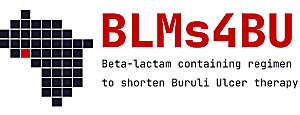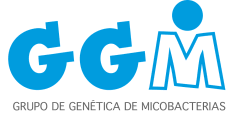
Buruli ulcer
Beta-lactam containing regimen for the shortening of Buruli ulcer disease therapy:
comparison of 8 weeks standard therapy (rifampicin plus clarithromycin) vs. 4 weeks standard plus amoxicillin/clavulanate therapy [RC8 vs. RCA4] (BLMs4BU)
Buruli ulcer (BU), caused by Mycobacterium ulcerans, is a neglected tropical disease that affects skin, soft tissues and bones causing long-term morbidity, stigma and disability. The greatest burden falls on children in sub-Saharan Africa. BU prevention and transmission remain unknown, and thereby, early diagnosis and treatment are crucial to minimize morbidity, costs and prevent long-term disability. Treating BU requires 8-weeks with daily rifampicin and clarithromycin (recommended by the World Health Organization, WHO), wound care, and sometimes tissue grafting and surgery. Healing can take up to one year. Compliance is challenging due to socioeconomic determinants and may pose an unbearable financial burden to the household.
A single blinded, randomized, controlled open label non-inferiority phase II, multi-centre trial in Benin started in 2021, while a year later the study began in Ghana, Togo, and the Ivory Coast, all of which are endemic countries for Buruli ulcer. Participants are stratified according to BU category lesions and randomized in two oral regimens: (i) Standard [RC8]: rifampicin plus clarithromycin (RC) therapy for 8 weeks; and (ii) Investigational [RCA4]: standard treatment (RC) plus amoxicillin/clavulanate (A) for 4 weeks. The primary efficacy outcome will be lesion healing without recurrence and without excision surgery 12 months after start of treatment (i.e. cure).
An effective RCA4 treatment will shorten treatment times, potentially reducing healing times and increasing compliance that will also reduce patient and health system costs. A positive outcome of this trial could provide the basis for implementation of a new treatment in BU endemic countries, which could guide changes in WHO policy and practice.
This international research project, made up of organizations from the North and South Global, is coordinated by the ARAID Foundation and the University of Zaragoza and involves the Raoul Follereau Foundation (France), the Carlos III Health Institute (Spain), the University
Abomey-Calavi (Benin), DAHW Deutsche Lepra-und Tuberkulosehilfe e. v., (Germany/Togo), Kwame Nkrumah University of Science and Technology (Ghana), Ghana Health Service (Ghana), Fundación Anesvad (Spain), Program National de Lutte contre la Lèpre et l’Ulcère de Buruli (Benin), Program National de Lutte contre l’Ulcère de Buruli (Ivory Coast) and Program National des Maladies Tropicales Négligées (Togo). The trial is funded by the Tres Cantos Open Lab Foundation and supported by GSK, and is it has been extended to the Ivory Coast, Ghana and Togo, thanks to funding from the Anesvad Foundation.
For more information check: https://blms4bu.org/

